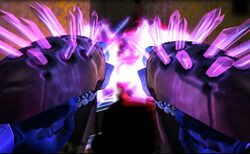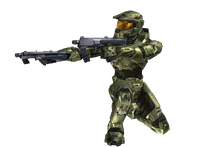Dual wielding: Difference between revisions
From Halopedia, the Halo wiki
No edit summary |
|||
| Line 58: | Line 58: | ||
''[[Halo 3: ODST]]'' | ''[[Halo 3: ODST]]'' | ||
Dual wielding will be disabled in ''[[Halo 3: ODST]]'' because you are an [[Orbital Drop Shock Trooper|ODST]] and not a [[Spartan-II]]. | Dual-wielding will be disabled in ''[[Halo 3: ODST]]'' because you are an [[Orbital Drop Shock Trooper|ODST]] and not a [[Spartan-II]]. | ||
==Related Links== | ==Related Links== | ||
Revision as of 09:47, August 20, 2009
Dual Wielding is a special combat technique in which a gunman wields two weapons at once, one in each hand. This feature was first introduced into the Halo video game series in Halo 2 and is continued in Halo 3.
General Information
Dual wielding allows a player to use two weapons at any one time. The saying is that "two heads are better than one," and dual wielding is no different. Players often develop a liking or disliking to certain dual wielding combinations. If the dual wielded weapons are different, the game will simply combine the reticules. Halo 2 is the only game where enemies are seen dual wielding, and all those enemies are Elites. The Elites are most often seen dual wielding a pair of Plasma Rifles or Plasma Pistols. Elites have been seen dual wielding combinations of a Needler and a Plasma Rifle as well. Most Ranger Elites dual wield Plasma Rifles. In Halo 3 the Brutes never dual wield, but ally Elites are occasionally seen dual wielding. No Marines are ever seen dual wielding because their HUDs don't support this function. The exception of Miranda Keyes was only during a cutscene at the end of the level Quarantine Zone. A mod for Halo: Combat Evolved has allowed for dual wielding, but is very glitched to the point of not working. All dual wieldable weapons have no scope function.
A weapon can't be dual wielded just because it can be operated by only one hand. Elites can be given Rocket Launchers or Fuel Rod Cannons which they will wield with only one hand. Neither weapon can be dual wielded by an Elite in the campaign or multi-player without mods. Similarly, the Needler (which was dual-wieldable in Halo 2) is no longer dual-wieldable in Halo 3.
Before the release of Halo 3, the Halo: Graphic Novel had Elites dual wielding Swords. There were elements of the community who believed this could be balanced, with others believing that it would be impossible without making it anymore of a "noob" weapon than it is already considered, and others believing it wouldn't matter since the sword is usually a one-hit kill weapon anyhow. Ultimately, it is not known if it was ever actually considered as a feature in the actual game; nonetheless, in the finished game, the Energy Sword was treated as a two-handed weapon.
Advantages/Disadvantages

Advantages
- Enhanced Firepower: When a player is dual-wielding, the two weapons in conjunction are more powerful than a single weapon of the same type. This allows for enhanced firepower, with double the ammo capacity and firing rate.
- Greater Versatility: Two weapons wielded in conjunction can perform multiple roles at the same time. For example, a player could wield an M6G Magnum in one hand, allowing him/her to shoot accurately over longer range, and a Mauler in the other for close range firepower.
- More Effective Combos: Likewise, dual-wielding a plasma weapon and a ballistic weapon can confer a unique advantage: Plasma weapons are stronger against shields, and ballistic weapons are stronger against armor. For example, a player may choose to dual-wield a Plasma Rifle and an SMG at the same time. The Plasma Rifle can take down the shields of an opponent and the SMG can shred through the opponent's armor, allowing for a very fast and efficient kill. At longer ranges, a charged Plasma Pistol shot followed by a quick Magnum headshot will also kill an opponent.
- Doubled Ammo Reserve: When you dual-wield certain weapons of the same type, such as two SMGs or two Needlers, the player character can carry double the amount of reserve ammunition for the weapons. This is a trick also exploited when Triple wielding.
- Constant Firepower: While dual-wielding, it is possible to reload or cool-off one weapon and fire the second one at the same time. This allows for a constant barrage; it generally takes longer to empty a magazine than to reload one. The only disadvantage is when reloading your automatic or long-range weapon, you may be stuck with your alternate weapon in a life threatening situation. Constant fire is helpful when you are in a place with enemies out in the open, or in point blank range where a rapid firing will result in a deadly strike.
Disadvantages
- Inability to Melee Attack, Throw Grenades, or Use Equipment: When a player is dual-wielding, the player must drop the left weapon in order to free a hand to throw grenades, and deploy equipment. This action of dropping a weapon takes time and is disadvantageous. However, if you Melee while dual-wielding, the left weapon will automatically drop by itself and the Melee will come out straight away.
- Reload/Overheat Window: When a player must reload their weapons, or if the weapons overheat, the player is vulnerable because they can't melee attack or throw grenades without dropping their weapon. Reloading a weapon also takes longer time when dual-wielding than while single-wielding the same weapon; however, for Covenant weapons, the "cool down" time remains the same, as does the Needler's reload time.
- Accuracy Decrease: Most weapons are slightly more accurate when single-wielded than when dual-wielded, such as the Plasma Rifle and the SMG.
- Consumes Double the Amount of Ammo: While the player can carry double the amount of ammunition, the weapons also reload from the same pool, thus using up double the amount of ammunition per reload.
Changes in Halo 3
The primary difference between Halo 2 and Halo 3's dual wield is that the player can now fully control the reloading process. In Halo 2, the player was forced and strained to reload the two weapons simultaneously at the same directed time. In Halo 3, players could reload the left weapon first while keeping the right weapon ready, vice versa, or both at once, independent of each other. By doing this, multi-player gameplay is balanced.
Another difference between Halo 2 and Halo 3 dual wield is the alteration in the amount of damage dealt per weapon. In Halo 2, there is no change in the amount of shots needed to kill if you are single or dual wielding. In Halo 3, with the exception of the Plasma Pistol, when you dual wield each weapon becomes individually weaker by varying degrees. This becomes especially noticeable when overshields are in use.
In Halo 2, the player pressed Y to dual wield. In Halo 3 the player must press LB.
List of Dual Wieldable Weapons
Dual Wieldable weapons must be able to be used single-handed, and therefore are mostly those of closer range and less accuracy. Most long-range weapons, such as the BR55 Battle Rifle, are two-handed. "Power" weapons such as the Shotgun and Energy Sword are also two-handed weapons.
- M7/SMG (New Weapon in Halo 2).
- M6C Magnum (Exclusive to Halo 2).
- Plasma Pistol
- Plasma Rifle
- Brute Plasma Rifle (Appeared in Halo 2. (No longer dual- wieldable in Halo 3: ODST).
- Needler (No longer dual-wieldable in Halo 3).
- M7/SMG (First appeared in Halo 2).
- M6G Pistol (New Pistol).
- Plasma Pistol
- Plasma Rifle
- Spiker (New Weapon).
- Mauler (New Weapon).
Dual-wielding will be disabled in Halo 3: ODST because you are an ODST and not a Spartan-II.

